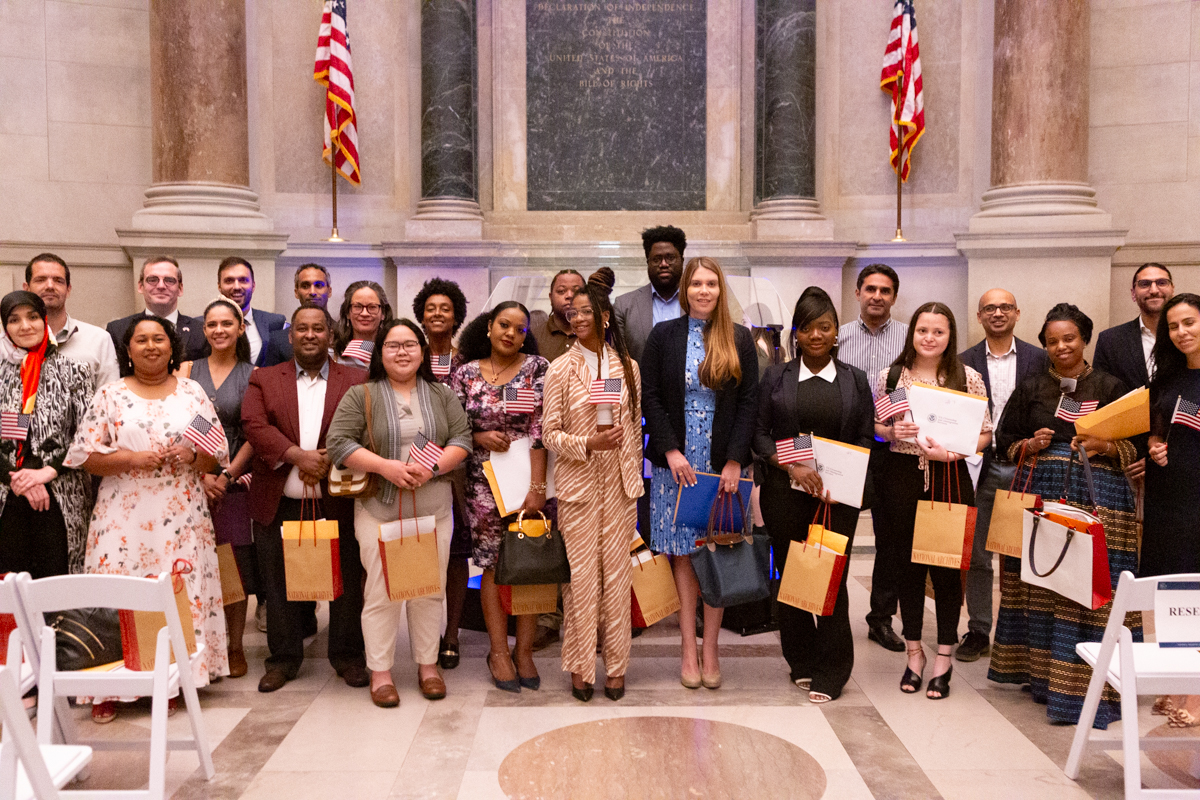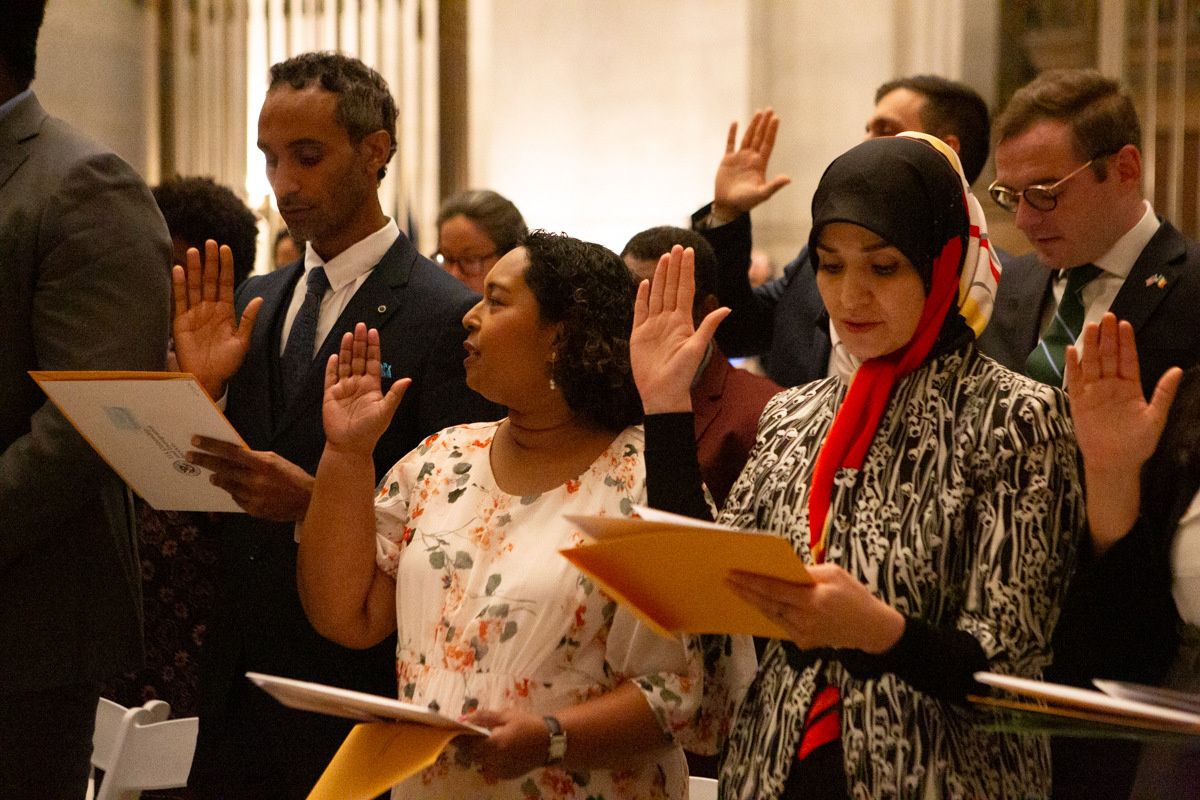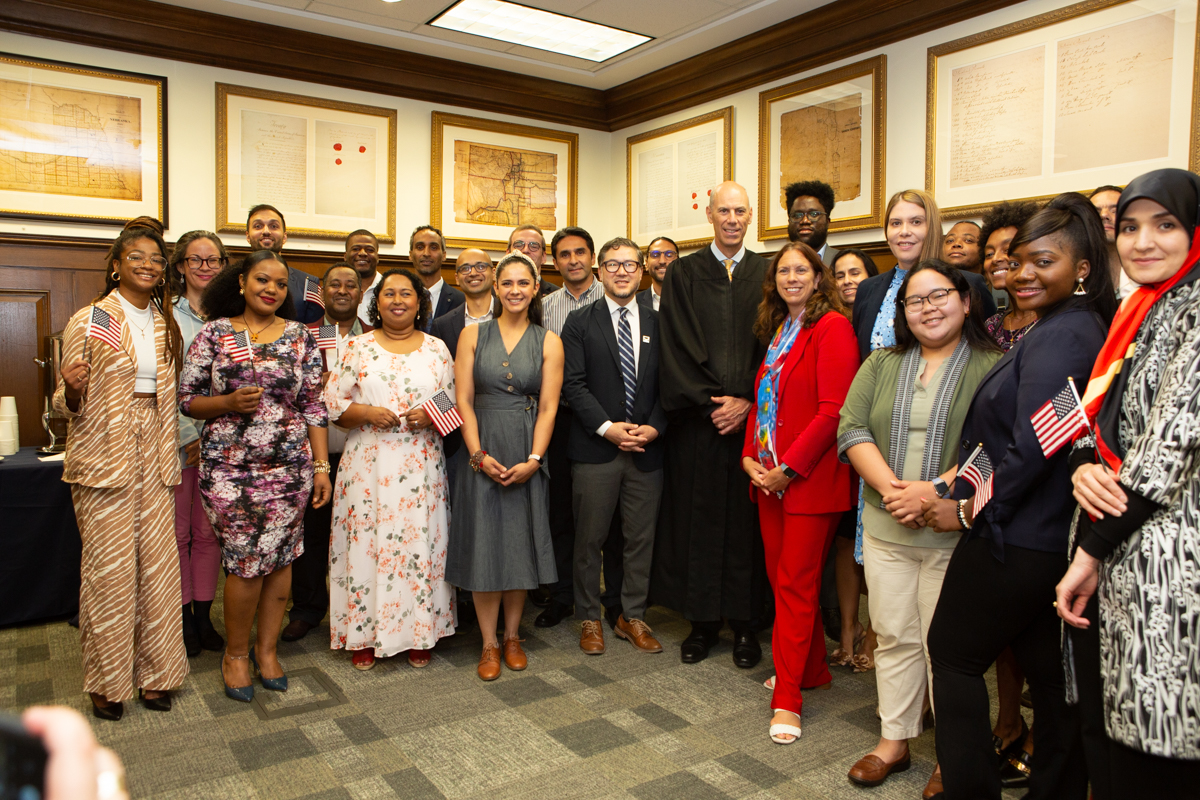
Enlarge
Twenty-five new citizens pose for a group portrait in the Rotunda after becoming U.S. citizens during a naturalization ceremony at the National Archives in Washington, DC, on September 15, 2023. National Archives photo by Susana Raab.
By Pete Lewis | National Archives News
WASHINGTON, September 19, 2023 — In celebration of Constitution Day, observed on September 17, 25 men and women from 24 nations took their oaths of citizenship in front of the nation’s Founding Documents (the Bill of Rights, the Constitution, and the Declaration of Independence), on September 15, in the Rotunda of the National Archives Museum in Washington, DC.
The National Archives traditionally hosts two naturalization ceremonies in the Rotunda annually, the first in September to mark Constitution Day and the second in December in honor of Bill of Rights Day.

Enlarge
New citizens swear the Oath of Allegiance to the United States during their naturalization ceremony in the National Archives Rotunda in Washington, DC. September 15, 2023. National Archives photo by Susana Raab.
The ceremony was hosted by Dr. Colleen Shogan, 11th Archivist of the United States. The Honorable James E. Boasberg, Chief Judge of the United States District Court for the District of Columbia, presided as the petitioners for United States citizenship took the oath of citizenship. Students from Alice Deal Middle School in Washington, DC, recited the Preamble of the Constitution.
Shogan spoke to the new citizens of the importance of the Founding Documents and the rights they upheld for all U.S. citizens.
“These Charters are the bedrock of our democracy; but they are not static relics,” she said. “They are a testament to the enduring values of freedom, justice, and equality that we are continuously striving to perfect. They are living promises—a covenant between the government and its citizenry.”
As the new Americans listened on, Shogan further offered hospitable words.
“As the Archivist of the United States, it is my distinct honor to be the first to officially welcome you as the newest members of our big boisterous American family!” she said.
The 25 new citizens are originally from 24 nations: Afghanistan, Bangladesh, Belarus, Cameroon, Canada, Colombia, Dominican Republic, Egypt, El Salvador, Eritrea, Ethiopia, Germany, Ghana, Guyana, Hungary, India, Ireland, Jamaica, Mexico, Philippines, Portugal, Senegal, Serbia, and Venezuela.
Alex Marki, a researcher from Hungary, said he wanted to become a U.S. citizen in order to help people through his work.

Enlarge
At center, keynote speaker Reverend Eugene Cho, the Honorable James E. Boasberg, and Archivist of the United States Dr. Colleen Shogan pose with new citizens after the naturalization ceremony held in the National Archives Rotunda in Washington, DC. September 15, 2023. National Archives photo by Susana Raab.
“America, I believe, is the best place in the world for research today. I'm really impressed by how many good things come out from this country; inventions, medicines, technologies,” Marki said. “I really want to contribute to this… so I decided to stay here and be part of this country and contribute to my best."
Aram Earsa, an Iranian who emigrated to Canada before seeking citizenship in the U.S., said he is happy to be part of "an amazing country, with a unique history."
"I'm very happy to finally complete my journey today and become a United States citizen,” Earsa said. “This country has always contributed to progress over the years, and I would be happy to be part of the future improvement and future progress of this country."
This year’s Constitution Day marks the 236th anniversary of the ratification of the U.S. Constitution. Learn more online about the U.S. Constitution through our public programs, family activities, and online resources.
This program was presented thanks to a long-standing partnership between the U.S. District Court for the District of Columbia and the Department of Homeland Security U.S. Citizenship and Immigration Services.
To view the ceremony, visit the National Archives YouTube Channel.
To view photos from this ceremony, visit the National Archives Flickr page.
 Latest News Articles
Latest News Articles Do you have an RSS newsreader? You may prefer to use this newsletter's RSS feed at:
Do you have an RSS newsreader? You may prefer to use this newsletter's RSS feed at: